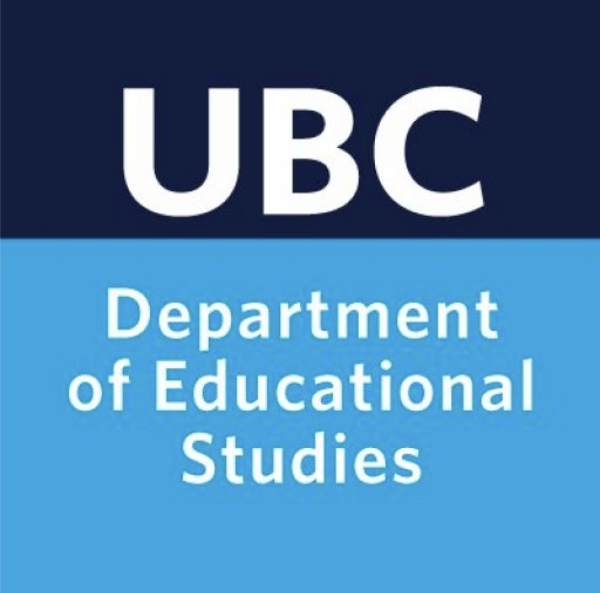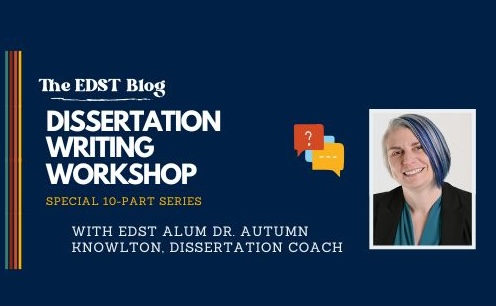In August 2025, EDST doctoral students were invited to attend two dissertation writing workshops led by Dr. Autumn Knowlton, EDST alum, Dissertation Coach, and professional editor at (Re)Visions. The workshops offered clear, practical guidance on how to approach each part of the dissertation, from the early stages of planning to writing the final conclusion.
One participant said “I wish I had this information earlier, like in my first year of my PhD! This was so helpful, wow!”
The workshops emphasized clarity, structure, and scholarly confidence—reminding students that a dissertation is not a book, but a focused scholarly document with a clear purpose: to answer a research question and make a meaningful contribution to knowledge.
Click to view the presentation slides.
What the Workshops Covered
- Understanding the dissertation as a genre
- Planning for structure and flow
- Developing and refining research questions
- Writing each chapter with clarity and purpose
- Handling feedback, ethics, and positionality
- Presenting findings and analysis effectively
- Staying focused and finishing well
Explore the 10-Part Blog Series
This blog series summarizes key insights from the workshops. Each post offers practical tips to help you navigate dissertation writing with confidence.
- Not a Book, Not a Mystery: What Your Dissertation Really Is
What a dissertation really is—and who you’re writing it for. - From Jumble Sale to Funnel: Planning Your Dissertation for Clarity and Flow
Planning for structure, clarity, and flow using APA7 and funnel logic. - Hold the Target, Not the Dart: Crafting and Evolving Your Research Questions
How to craft and evolve a research question that guides your entire dissertation. - Conversations, Not Catalogues: Writing a Literature Review with Purpose
Writing a literature review that supports your research, not just lists sources. - Kitchen Rules: Conceptual and Theoretical Frameworks Explained
Choosing and using conceptual or theoretical frameworks that do real analytical work. - You Are the Method: Positionality, Ethics, and Making Knowledge
Aligning your methodology, ethics, and positionality with your research question. - Sock Time: Presenting Your Findings with Clarity and Confidence
Presenting your findings clearly and showcasing your Significant Original Contribution to Knowledge (SOCK). - Weaving the Threads: Discussion and Meaning-Making
Bringing together your findings, framework, and literature in the discussion chapter. - “What I Did, Why It Matters”: Writing Your Scholarly Conclusion
Writing a conclusion that shows your contribution, implications, and next steps. - Don’t Go in Circles: Writing, Editing, and Staying Sane
Managing the writing and editing process, using style guides, and staying focused.
Resources
Dissertation Preparation and Policies
- UBC Grad Studies – Getting Started:
https://www.grad.ubc.ca/current-students/dissertation-thesis-preparation - Style Guides and Computer Tools:
https://www.grad.ubc.ca/current-students/dissertation-thesis-preparation/style-guides-computer-tools
Writing Support and Self-Guided Modules
- EDST Thesis Writing Module:
https://thesismodules.edst.educ.ubc.ca/ - Developing a Dissertation (EDST Module):
https://thesismodules.edst.educ.ubc.ca/module-library/developing-a-dissertation/ - UBC Library Dissertation Guide:
https://guides.library.ubc.ca/dissertation
Free One-on-One Writing Support
- UBC Writing Consultations for Graduate Students (writing and referencing help):
https://writing.library.ubc.ca/graduates/writing-consultations/
Workshop Slides and Presenter
- Click to view Dr. Autumn Knowlton’s workshop presentation slides.
- Dr. Autumn Knowlton – (Re)Visions Website: https://www.autumnrevisions.com/
Explore More
UBC EDST students can access free tools and support through the Thesis Writing Module and the Developing a Dissertation module. For writing and referencing help, book a free graduate writing consultation.


Leave a Reply